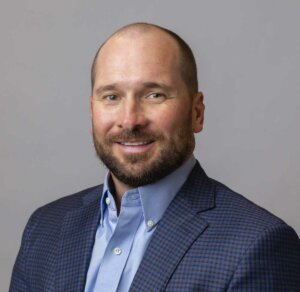
Customers can buy car insurance without even seeing an agent these days. Business insurance, though, is a complex product better purchased with one-on-one advice.
That’s the opinion of several Alabama commercial insurance experts. They agree that the digital age has changed how business owners buy coverage, but as for now only in small ways.
To better assess complicated products like technology error or cyber coverage, they believe company managers really need to sit down with a broker or agent instead of trying to do it all online.
Kyle Drumwright, president of Starke Agency in Montgomery, sees technological advancements in the sale of insurance products as “a huge advantage in our business for an enhanced customer experience.”
Insurance, though, “is still very much a people business when you get to the bottom of it.
“Clients still want to know they have a knowledgeable agent on the other end of the transaction,” he says.
Grantland Rice IV, chief administrative officer of Cobbs Allen in Birmingham, says the digital age hasn’t brought about “as much change as you would expect.
“In-person interactions are still the best way to win new business,” Rice says, and they make up the majority of his broker business.
“A lot of us like our expertise to shine,” he adds, emphasizing the value of meeting face-to-face.

Gabe Clement, president of Byars|Wright in Birmingham, agrees. “We still sell in person, now with added digital benefits,” Clement says. “Relationships are the heart of what we do. We believe it’s the best way to get to know our clients and carriers on a deeper level.”
Whether it’s a property walk-through or pre-renewal meeting, “we’d like to meet in person so that we can shake their hand, sit down and treat people the way we’d want to be treated,” he says.
Like Drumwright, Clement calls insurance “a people business.”
Andy Lott, Birmingham regional president of the Insurance Office of America, says “one could argue that we never stopped selling in person.
“We’ve just added new technologies and multichannel options to the mix to meet the customer whenever and wherever they need to secure help and coverage,” says Lott.
Clement says that digital improvements to his company’s website years ago allowed customers to find insurance cards, policy information and begin a claim.
“We work with various insurance carriers to find the best quality coverage at competitive prices, so we do not offer instant quotes,” he says.
“One of the reasons we prefer speaking with our customers in person is that we believe they each have a unique story that is better understood on a personal level,” says Clement.
“Especially with commercial clients, their stories matter. How they’ve grown the organization, why they do what they do, and what they want to achieve in the future are key pieces to the puzzle that allow us to build comprehensive insurance programs and risk management strategies.”
Rice says that even insurance sites that claim to offer instant quotes will “spit you out” if someone needs special coverage. If a business is in a coastal area, for example, “right away you’re not going to be able to get a quote online” due to hurricane exposure.

Selling insurance exclusively online really pertains mostly to smaller lines or personal and program business, says Brian Tanner, managing principal of Epic Brokers in Birmingham. (Program coverage is for a specific type of business.)
“When you get into the middle markets and larger, I just don’t think that at this point in time you can really replace human interaction,” he says.
For example, a business owner filling out an application might not know how to answer the questions, “taking yourself down the wrong path of coverage.”
“A lot of the digital interfaces can only decipher so much,” says Tanner.
“It is going to be very difficult for someone who is not an insurance expert to walk through this and get the absolute best coverage.”
The majority of commercial customers still want face-to-face meetings, Lott says, even if those faces are on a screen via Microsoft Teams.
“Most prefer to discuss information on complex risks in a more visual setting and receive written confirmation afterward,” Lott says.

In addition to online information, “we have SimplyIOA, which is an online insurance quote, compare and buy platform for home and auto insurance. It is the first fully integrated quote comparison and buy platform in the United States,” Lott says.
Insurance agents should have a seat at the table with business owners and other decision-makers like lawyers or financial advisors, he says.
“When a business owner meets with an agent, there are discoveries from their conversation that often unearth key exposures that may be missed otherwise,” Lott says. “These inquiries produce a deeper understanding of the business’ makeup and allow for discussion on risk appetite, culture and other key factors to help decide the best program for the business.”
“All insurance is not equal, I promise,” says Tanner. “Most people make the mistake of buying based on price. They should buy insurance based on the quality of coverage and the price should be secondary.
“You’ve got to have a qualified advisor sitting there walking through everything you need, making sure the policy you’re buying and procuring is indeed the policy you need should a bad event occur.”
A cheaper policy might sound better but might not cover “stuff on the fringes,” says Tanner, who is an independent insurance broker.
To seek new business in a digital age, the successful strategies evidently are the old-fashioned ones.
Tried-and-true cold calling is still the best way to acquire new business, Tanner believes.
“I’ve been doing this a long time and I’ve seen many people come into this business and fail because they had a better way of doing it and the reality is that cold calling outperforms any other type — from my perspective — of pursuit,” Tanner says. “If you get good at it, you get more efficient at it and more proficient at it.
“What I still teach my people is that if you are cold calling you are actually pursuing business. You are actually chasing deals versus referrals where a lot of the time you’re waiting to play catcher.”
Even so, a pitch can fail if it sounds canned, he says.
Tanner always has a comeback for prospects who are happy with their current coverage.
“You have to be very honest. You have to be very witty. You have to be very factual,” he says.
Rice says his firm’s brokers do the expected cold-calling but also attend industry events where they have expertise.
“Being recognized as an expert, having an opportunity to speak, you end up getting some inbound calls,” he says.
Deborah Storey is a freelance contributor to Business Alabama. She is based in Huntsville.
This article appears in the September 2023 issue of Business Alabama.



